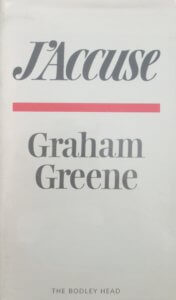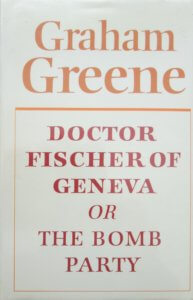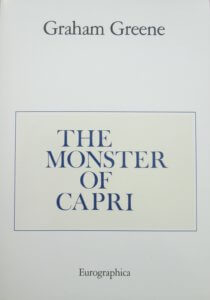Recently, Jonathan Bourget, the grandson of Graham Greene, was interviewed by Antonello Guerrera, a correspondent for the Italian newspaper La Repubblica. We are grateful to Trustee Jonathan Steffen for arranging for us to publish this article and, especially, to Barbara Newton, another of our Trustees, for her translation.
A quiet Englishman, actually no. “He was running away his whole life” his grandson Jonathan Bourget, 56, tells us on the phone from the pleasant valley near Geneva where he lives. “He was escaping from depression, boredom, celebrity.”
Who was Graham Greene really? One of the greatest writers ever, obviously. But also one of the most mysterious, shy and forever complex. 30 years have passed since his death from leukaemia at 86, on 3rd April 1991 at Corsier-sur-Vevey in the Vaud Canton of Switzerland, where, together with his last love, Yvonne Cloetta, he had decided to gently live out the rest of his life. Now a new monumental biography has been published by Seller which tries to make sense of the masterly existential enigma which was this novelist and ex- MI6 English spy: “Russian Roulette. The life and Times of Graham Greene” by Richard Greene (no relation despite the shared surname).
This is a remarkable volume which details with masterly precision the dominance both in literature and in life of a prodigious storyteller, the author of idiosyncratic surreal and prophetic masterpieces like “Our Man in Havana”, “The Power and the Glory” and “A Quiet American”. Because, from his childhood onwards, Greene’s life was harsh; traumatised by the spurting gush of blood from his tonsils when they were brutally removed at home when he was a child; bullied by his friends for being the son of the Headmaster of Berkhamsted School; tormented by suicidal thoughts and bipolar disorder, which were to fracture definitively his mind, body and soul. As for his soul, he converted to Catholicism at the desire of his first wife Vivien Dayrell-Browning, the mother of their two children and whom he got to know during the Twenties when she wrote a letter of criticism to the journalist Greene, and from whom he separated without ever divorcing her after the Second World War.
But then comes the vivid narrative of someone who for decades was brave enough to look steadily into those glacial eyes, Jonathan Bourget, brought up in a family home where there were silences, secrets, strife. Last month, “possibly from an aneurism” Jonathan’s mother died. She was Greene’s eldest and much loved daughter, 87-year-old Lucy Caroline Bourget Greene. The second child, Francis, 85, an extremely reserved world traveller and adventurer like his father, whose author’s rights he looks after, accorded a last brief interview 20 years ago before shutting himself away in his bucolic Devon mansion, and Greene’s last assistant, Amanda Saunders, died a number of years ago.
Jonathan, who was Graham Greene for you?
A grandfather with whom I had a straightforward relationship. He was constantly hiding from the media, from interviews, from photographers. Before moving to Switzerland like us, he came to visit us several times a year, at Christmas… at Easter. Maybe he had just come back from his beloved Panama or Nicaragua and we would sit round the fire: it was wonderful to hear his stories.
What sort of a person was he?
He was obsessed with American propaganda and the flaws in their foreign policy, with their interventions in Nicaragua or South America, with how the United States and the CIA “always manage to shoot themselves in the foot.” He told us about everything he had seen. Then there were his memories of the war, the first time he fired a gun (during the Second World War he was in Sierra Leone, then in Vietnam -editor’s note) He was very proud of it. On the other hand, I remember how much he suffered for his pamphlet “J’Accuse” about corruption in Nice and because of the mayor Jacques Médecin, who sued him for  defamation, which drained him of much of his energy towards the end of his life. It is a pity that Graham died three years before Médecin was arrested in 1994.
defamation, which drained him of much of his energy towards the end of his life. It is a pity that Graham died three years before Médecin was arrested in 1994.
What was your grandfather’s greatest quality?
He was afraid of nothing. Nothing. And right to the last he fought for justice and truth.
Is that the most important lesson you learned from him?
Yes, together with the importance of defending one’s own principles, always and no matter what. Otherwise he was a big man, always kind. But it wasn’t a good idea to provoke him, like when I made a racket with some friends in his house in Anacapri. He could become fierce above all towards the young.
It is said that Greene could not bear young people, as shown in Brighton Rock and other books of his, and that he was distant with you grandchildren. Is that true?
No. With us as a rule he was always kind and generous. He played chess with my brother Andrew and with me he played Monopoly. With my mother he played cards, Gin Rummy. And you know English families are like that, above all in those days, feelings were hidden. You had to discover them yourself.
Is the same true for the rocky relationships Greene had with women? He never divorced but he had affairs as well as long-lasting relationships; Lady Walston for 20 years, Yvonne Cloetta for another 26 years.
Let me repeat, English families are like that. Such things were not talked about. But I am sure that my grandfather was a very loving man. Otherwise, his stories would not have stood the test of time.
And did you talk about his novels?
No. But we didn’t ask him about them. Graham was very disciplined in his work. He would write 500 words each day, and that was it. Even when he was particularly inspired he never wrote more. Nevertheless, we felt ourselves to be part of grandfather’s world and his books; he put his life into his books. “Dr  Fischer of Geneva” for example, was inspired by one of our family dinners. Otherwise he only had two aims in life: to defend the disadvantaged and to kill boredom.
Fischer of Geneva” for example, was inspired by one of our family dinners. Otherwise he only had two aims in life: to defend the disadvantaged and to kill boredom.
Why?
Because boredom was the curse of his whole life, like the depression and the mental health issues from which he suffered. It was perhaps because of this that as a boy he “played” at Russian roulette. There was nothing my grandfather hated more than boredom. He had to alleviate it in any way he could.
Was Graham Greene an unhappy man? In his old autobiography “Ways of Escape” one gets that impression.
No, I don’t think so. He suffered a lot but he also had many satisfactions. And in his later years he was more at peace with his inner demons.
Tell us about those last years when he moved to Switzerland with Yvonne Cloetta a few kilometres from you. Those were the long months of your grandfather’s final illness. Was Greene afraid of dying?
No. After the kind of life he had had, Graham had already accepted the end. He also confirmed this to me during the last conversation we had at home, while he was bedridden, before being taken to hospital. He was only interested in “how” to die. As a Catholic he was very interested in what was on the other side. But there was something else that drove him crazy.
What?
Because of the illness, the doctor had reduced his daily alcohol intake to one single beer a day. He couldn’t accept it. As the afternoon wore on, he would look at the clock more and more anxiously.
At least at that time Charlie Chaplin, who was a great friend of your grandfather, lived in Switzerland.
They had known each other for a long time. Graham supported Chaplin when he was caught up in the McCarthy witch-hunts. They had done a few wild things over the years. They were good friends. Certainly I was disappointed as a boy, when Chaplin came to our house for the first time. I expected the clown with the bowler hat he wore in his films. Instead there was an old man in a wheelchair.
Your grandfather often just missed but was never awarded the Nobel Prize for Literature. Was this a regret for him?
Not at all. Graham was not someone who wrote in order to receive recognition, or prizes and least of all celebrity, but only for himself, to escape. He was more pleased to receive honours from Nicaragua or Panama.
Why do you always call your grandfather by his first name?
“When I was small I always called him grampa. But then he got annoyed and said “No, call me Graham!” Perhaps because he didn’t want to feel old? I don’t know. He never told me why.
_____________________
 When they were young, Greene wrote two stories for his grandsons Andrew and Jonathan which he sent to them handwritten on the backs of a series of picture postcards of Corfu Island. The stories were called ‘The Monster of Capri’ and ‘The Monster’s Treasure’. The two stories, illustrated with reproductions of the postcards and Greene’s handwritten text, were published by Eurographica in 1985 in a signed, limited edition.
When they were young, Greene wrote two stories for his grandsons Andrew and Jonathan which he sent to them handwritten on the backs of a series of picture postcards of Corfu Island. The stories were called ‘The Monster of Capri’ and ‘The Monster’s Treasure’. The two stories, illustrated with reproductions of the postcards and Greene’s handwritten text, were published by Eurographica in 1985 in a signed, limited edition.
There is an interesting echo to Jonathan Bourget’s comment about Graham not wanting to be called ‘grampa’. His son Francis, around 1955, decided to stop referring to his father as ‘Daddy’ but to use ‘Graham’ instead. Perhaps Greene liked the idea.